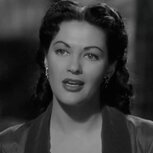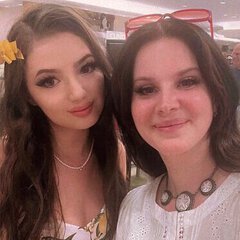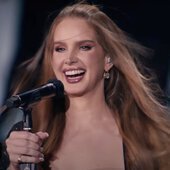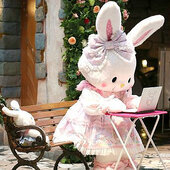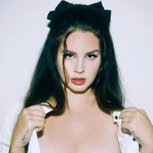-
Content Count
638 -
Joined
-
Last visited
Reputation Activity
-
fishtails liked a post in a topic by War In My Mind in Blue Banisters - Merch & Media Drop
It came !
-
khomj liked a post in a topic by War In My Mind in Instagram Updates
I was a brian stan but rethinking, it's actually Andrea, she's the only one who didnt cut Lana off and she's the only one who got answers to hardhitting question. Like that obscure instagram account Birthdaycake indeed being Lana's own creation.
-
alexbeygul liked a post in a topic by War In My Mind in Blue Banisters - Merch & Media Drop
My order didn't come today like was given to me (the date). But I low key didnt expect it to. It shipped from Michigan on Friday and I live in Florida and I was like no way they drive their little fedex truck for 15 hours straight to Florida in 1 business day and 1 saturday. But now it's in Georgia so I'm p. confident I'll get it tomorrow (since I live in that old... Tallahassee)
-
fishtails liked a post in a topic by War In My Mind in Blue Banisters - Merch & Media Drop
My order didn't come today like was given to me (the date). But I low key didnt expect it to. It shipped from Michigan on Friday and I live in Florida and I was like no way they drive their little fedex truck for 15 hours straight to Florida in 1 business day and 1 saturday. But now it's in Georgia so I'm p. confident I'll get it tomorrow (since I live in that old... Tallahassee)
-
5Rick liked a post in a topic by War In My Mind in Blue Banisters - Merch & Media Drop
My order didn't come today like was given to me (the date). But I low key didnt expect it to. It shipped from Michigan on Friday and I live in Florida and I was like no way they drive their little fedex truck for 15 hours straight to Florida in 1 business day and 1 saturday. But now it's in Georgia so I'm p. confident I'll get it tomorrow (since I live in that old... Tallahassee)
-
trailerparkdream liked a post in a topic by War In My Mind in Blue Banisters - Post-Release Discussion Thread + Poll
the aesthetic is her backyard
-
Distantly liked a post in a topic by War In My Mind in Blue Banisters - Merch & Media Drop
My order didn't come today like was given to me (the date). But I low key didnt expect it to. It shipped from Michigan on Friday and I live in Florida and I was like no way they drive their little fedex truck for 15 hours straight to Florida in 1 business day and 1 saturday. But now it's in Georgia so I'm p. confident I'll get it tomorrow (since I live in that old... Tallahassee)
-
TheCultureIsLit liked a post in a topic by War In My Mind in Violets for Roses
oh man I didnt even look at the lyrics elle posted. I hear rolls' every time. Didnt even think someone might hear horses.
-
blackenedrussianpoetry liked a post in a topic by War In My Mind in Violets for Roses
This is slowly becoming a favorite track of mine so I wanted to a close reading of the lyrics. Hopefully, you enjoy and remember this is my interpretation of the song.
The first line of the song echoes her song “Change” where she begins the song with “There’s something in the wind, I can feel it blowin’ in”, whereas in “Change” the song is eerie and is anticipating change, be it good or bad, in “Violets for Roses” the song immediately indicates that the/a change has already occurred, and we see it in the next two lines. Masks off and running happy, references the freedom (from COVID also making this song hyper-contemporary), but perhaps this is not necessarily true in the real world, since COVID is still running wild, it again echoes the album’s tone of the freedom and joy found in family.
The second “stanza” or pre-chorus makes explicit another change that has occurred—a breakup. However, unlike most break-up songs, this is neither an angry declaration nor a sad one, rather a happy one. The freedom that comes with breaking-up with someone because you can reallocate the love back to yourself. Perhaps from a relationship so toxic that you forget who you are and what you like, highlighted by the first line, “ever since I fell out of love with you, I fell back in love with me.”
In the chorus, there is the infamous line, “you made me trade my violets for roses,” a line perhaps not popular with the community but one that is nonetheless metaphorically symbolic. “Roses” have been known in poetry to represent love since medieval prose poetry. Similarly, violets are no stranger to Lana Del Rey’s own poetry (see: Violet Bent Backwards Over the Grass). While in the titular poem, Violet is a child of seven-years old, it could be argued that Violet is a personification of her own desires. The poem’s first stanza is a contemplation of everything she wants to do which is clashed with the presence of Violet in the second stanza:
and saw Violet
bent backwards over the grass
7 years old with dandelions grasped
tightly in her hands
arched like a bridge in a fallen handstand
grinning wildly like a madman
with the exuberance that only doing nothing can bring
waiting for the fireworks to begin
Her seeing Violet, carelessly enjoying her life, leads the poetess to let her own worries go:
and in that moment
i decided to do nothing about everything
forever.
Other than the clear intertextuality with her own oeuvre, Violets are also known to be compared to roses in the well-known poem:
Roses are red, violets are blue
Sugar is sweet, and so are you.
This poem, like Del Rey’s song, puts “violets” and “roses” in immediate contrast. The switching of placement in the chanteuse’s song, structurally emphasizes her identification with “violets” or her own desires, her own identity, with “roses” which represent love. Thus, “you made me trade my violets for roses,” is a confession, “you made me trade myself, my values, my joy for love.” A sentiment that harkens back to Del Rey’s third full-length album Honeymoon and the song “Terrance Loves You” where she confesses this pattern, “I lost myself, when I lost you”.
The rest of the chorus’ lyrics echo these sentiments. About a lover who made her sacrifice each aspect of her individuality (be it cars, toenail polish) in negotiation for love. The chorus ends with a declaration that any love that forces a woman to do this, is a doomed one.
The stanza that serves as the songs bridge repeats some of the lyrics from the first stanza of the song, but with this time a declaration of hope that this change is permanent. At first, the change being understood as this love for herself and the joy she finds in the everyday. While once again echoing perhaps the civil unrest that she first mentions in “Text Book” the opening track of Blue Banisters. Thus, with these final lines of this verse, the change she is mentioning is both the love she has for herself, but the change in society, macro and micro changes.
The final pre-chorus sees the singer re-embracing things that she used to love before she fell in love, “I fell back in love with the streets” and “I breakdance to the beat” and “God, does it sound sweet, like it’s playing just for me”. All sentiments reinforced by the final chorus and the outro which reaffirm the toxicity that love can have and that it is important to stay yourself and not to sacrifice what you love about yourself in order to be loved, in doing so you’ll find that that person forcing those sacrifices does not love you but loves controlling you. In the final lines of the outro, Lana is watching the girls again but seeing in them her own mask is now off, that toxic love, and it makes [her] so happy.
-
theresawordforitinjapanese liked a post in a topic by War In My Mind in Violets for Roses
This is slowly becoming a favorite track of mine so I wanted to a close reading of the lyrics. Hopefully, you enjoy and remember this is my interpretation of the song.
The first line of the song echoes her song “Change” where she begins the song with “There’s something in the wind, I can feel it blowin’ in”, whereas in “Change” the song is eerie and is anticipating change, be it good or bad, in “Violets for Roses” the song immediately indicates that the/a change has already occurred, and we see it in the next two lines. Masks off and running happy, references the freedom (from COVID also making this song hyper-contemporary), but perhaps this is not necessarily true in the real world, since COVID is still running wild, it again echoes the album’s tone of the freedom and joy found in family.
The second “stanza” or pre-chorus makes explicit another change that has occurred—a breakup. However, unlike most break-up songs, this is neither an angry declaration nor a sad one, rather a happy one. The freedom that comes with breaking-up with someone because you can reallocate the love back to yourself. Perhaps from a relationship so toxic that you forget who you are and what you like, highlighted by the first line, “ever since I fell out of love with you, I fell back in love with me.”
In the chorus, there is the infamous line, “you made me trade my violets for roses,” a line perhaps not popular with the community but one that is nonetheless metaphorically symbolic. “Roses” have been known in poetry to represent love since medieval prose poetry. Similarly, violets are no stranger to Lana Del Rey’s own poetry (see: Violet Bent Backwards Over the Grass). While in the titular poem, Violet is a child of seven-years old, it could be argued that Violet is a personification of her own desires. The poem’s first stanza is a contemplation of everything she wants to do which is clashed with the presence of Violet in the second stanza:
and saw Violet
bent backwards over the grass
7 years old with dandelions grasped
tightly in her hands
arched like a bridge in a fallen handstand
grinning wildly like a madman
with the exuberance that only doing nothing can bring
waiting for the fireworks to begin
Her seeing Violet, carelessly enjoying her life, leads the poetess to let her own worries go:
and in that moment
i decided to do nothing about everything
forever.
Other than the clear intertextuality with her own oeuvre, Violets are also known to be compared to roses in the well-known poem:
Roses are red, violets are blue
Sugar is sweet, and so are you.
This poem, like Del Rey’s song, puts “violets” and “roses” in immediate contrast. The switching of placement in the chanteuse’s song, structurally emphasizes her identification with “violets” or her own desires, her own identity, with “roses” which represent love. Thus, “you made me trade my violets for roses,” is a confession, “you made me trade myself, my values, my joy for love.” A sentiment that harkens back to Del Rey’s third full-length album Honeymoon and the song “Terrance Loves You” where she confesses this pattern, “I lost myself, when I lost you”.
The rest of the chorus’ lyrics echo these sentiments. About a lover who made her sacrifice each aspect of her individuality (be it cars, toenail polish) in negotiation for love. The chorus ends with a declaration that any love that forces a woman to do this, is a doomed one.
The stanza that serves as the songs bridge repeats some of the lyrics from the first stanza of the song, but with this time a declaration of hope that this change is permanent. At first, the change being understood as this love for herself and the joy she finds in the everyday. While once again echoing perhaps the civil unrest that she first mentions in “Text Book” the opening track of Blue Banisters. Thus, with these final lines of this verse, the change she is mentioning is both the love she has for herself, but the change in society, macro and micro changes.
The final pre-chorus sees the singer re-embracing things that she used to love before she fell in love, “I fell back in love with the streets” and “I breakdance to the beat” and “God, does it sound sweet, like it’s playing just for me”. All sentiments reinforced by the final chorus and the outro which reaffirm the toxicity that love can have and that it is important to stay yourself and not to sacrifice what you love about yourself in order to be loved, in doing so you’ll find that that person forcing those sacrifices does not love you but loves controlling you. In the final lines of the outro, Lana is watching the girls again but seeing in them her own mask is now off, that toxic love, and it makes [her] so happy.
-
cherrycolalime liked a post in a topic by War In My Mind in Blue Banisters - Post-Release Discussion Thread + Poll
same I have hyper empathy so this post made me cry too
-
alexbeygul liked a post in a topic by War In My Mind in Blue Banisters - Merch & Media Drop
My Fedex shipping ID for the Vinyl has updated to a tomorrow delivery. We did it joe. Cant wait to see the Blue cover with yellow vinyl in person.
-
Blue Ink liked a post in a topic by War In My Mind in Instagram Updates
Thinking about how she said she loves the song your girl and then reprimanded us again for leaking it with an eye stare
-
Blue Ink liked a post in a topic by War In My Mind in Instagram Updates
Lana in the last 15 minutes of this live:
-
Venice Peach liked a post in a topic by War In My Mind in Blue Banisters - Post-Release Discussion Thread + Poll
same I have hyper empathy so this post made me cry too
-
Ocean Boulevard liked a post in a topic by War In My Mind in Blue Banisters - Post-Release Discussion Thread + Poll
same I have hyper empathy so this post made me cry too
-
Elina liked a post in a topic by War In My Mind in Violets for Roses
This is slowly becoming a favorite track of mine so I wanted to a close reading of the lyrics. Hopefully, you enjoy and remember this is my interpretation of the song.
The first line of the song echoes her song “Change” where she begins the song with “There’s something in the wind, I can feel it blowin’ in”, whereas in “Change” the song is eerie and is anticipating change, be it good or bad, in “Violets for Roses” the song immediately indicates that the/a change has already occurred, and we see it in the next two lines. Masks off and running happy, references the freedom (from COVID also making this song hyper-contemporary), but perhaps this is not necessarily true in the real world, since COVID is still running wild, it again echoes the album’s tone of the freedom and joy found in family.
The second “stanza” or pre-chorus makes explicit another change that has occurred—a breakup. However, unlike most break-up songs, this is neither an angry declaration nor a sad one, rather a happy one. The freedom that comes with breaking-up with someone because you can reallocate the love back to yourself. Perhaps from a relationship so toxic that you forget who you are and what you like, highlighted by the first line, “ever since I fell out of love with you, I fell back in love with me.”
In the chorus, there is the infamous line, “you made me trade my violets for roses,” a line perhaps not popular with the community but one that is nonetheless metaphorically symbolic. “Roses” have been known in poetry to represent love since medieval prose poetry. Similarly, violets are no stranger to Lana Del Rey’s own poetry (see: Violet Bent Backwards Over the Grass). While in the titular poem, Violet is a child of seven-years old, it could be argued that Violet is a personification of her own desires. The poem’s first stanza is a contemplation of everything she wants to do which is clashed with the presence of Violet in the second stanza:
and saw Violet
bent backwards over the grass
7 years old with dandelions grasped
tightly in her hands
arched like a bridge in a fallen handstand
grinning wildly like a madman
with the exuberance that only doing nothing can bring
waiting for the fireworks to begin
Her seeing Violet, carelessly enjoying her life, leads the poetess to let her own worries go:
and in that moment
i decided to do nothing about everything
forever.
Other than the clear intertextuality with her own oeuvre, Violets are also known to be compared to roses in the well-known poem:
Roses are red, violets are blue
Sugar is sweet, and so are you.
This poem, like Del Rey’s song, puts “violets” and “roses” in immediate contrast. The switching of placement in the chanteuse’s song, structurally emphasizes her identification with “violets” or her own desires, her own identity, with “roses” which represent love. Thus, “you made me trade my violets for roses,” is a confession, “you made me trade myself, my values, my joy for love.” A sentiment that harkens back to Del Rey’s third full-length album Honeymoon and the song “Terrance Loves You” where she confesses this pattern, “I lost myself, when I lost you”.
The rest of the chorus’ lyrics echo these sentiments. About a lover who made her sacrifice each aspect of her individuality (be it cars, toenail polish) in negotiation for love. The chorus ends with a declaration that any love that forces a woman to do this, is a doomed one.
The stanza that serves as the songs bridge repeats some of the lyrics from the first stanza of the song, but with this time a declaration of hope that this change is permanent. At first, the change being understood as this love for herself and the joy she finds in the everyday. While once again echoing perhaps the civil unrest that she first mentions in “Text Book” the opening track of Blue Banisters. Thus, with these final lines of this verse, the change she is mentioning is both the love she has for herself, but the change in society, macro and micro changes.
The final pre-chorus sees the singer re-embracing things that she used to love before she fell in love, “I fell back in love with the streets” and “I breakdance to the beat” and “God, does it sound sweet, like it’s playing just for me”. All sentiments reinforced by the final chorus and the outro which reaffirm the toxicity that love can have and that it is important to stay yourself and not to sacrifice what you love about yourself in order to be loved, in doing so you’ll find that that person forcing those sacrifices does not love you but loves controlling you. In the final lines of the outro, Lana is watching the girls again but seeing in them her own mask is now off, that toxic love, and it makes [her] so happy.
-
Elle liked a post in a topic by War In My Mind in Blue Banisters - Post-Release Discussion Thread + Poll
same I have hyper empathy so this post made me cry too
-
alittleparty liked a post in a topic by War In My Mind in Blue Banisters - Post-Release Discussion Thread + Poll
same I have hyper empathy so this post made me cry too
-
CinnamonGay liked a post in a topic by War In My Mind in Blue Banisters - Post-Release Discussion Thread + Poll
same I have hyper empathy so this post made me cry too
-
War In My Mind liked a post in a topic by CinnamonGay in Blue Banisters - Post-Release Discussion Thread + Poll
Beautiful is soooooooo 😭😭😭😭😭
I'm SOBBING
-
drippingbeaches liked a post in a topic by War In My Mind in Violets for Roses
This is slowly becoming a favorite track of mine so I wanted to a close reading of the lyrics. Hopefully, you enjoy and remember this is my interpretation of the song.
The first line of the song echoes her song “Change” where she begins the song with “There’s something in the wind, I can feel it blowin’ in”, whereas in “Change” the song is eerie and is anticipating change, be it good or bad, in “Violets for Roses” the song immediately indicates that the/a change has already occurred, and we see it in the next two lines. Masks off and running happy, references the freedom (from COVID also making this song hyper-contemporary), but perhaps this is not necessarily true in the real world, since COVID is still running wild, it again echoes the album’s tone of the freedom and joy found in family.
The second “stanza” or pre-chorus makes explicit another change that has occurred—a breakup. However, unlike most break-up songs, this is neither an angry declaration nor a sad one, rather a happy one. The freedom that comes with breaking-up with someone because you can reallocate the love back to yourself. Perhaps from a relationship so toxic that you forget who you are and what you like, highlighted by the first line, “ever since I fell out of love with you, I fell back in love with me.”
In the chorus, there is the infamous line, “you made me trade my violets for roses,” a line perhaps not popular with the community but one that is nonetheless metaphorically symbolic. “Roses” have been known in poetry to represent love since medieval prose poetry. Similarly, violets are no stranger to Lana Del Rey’s own poetry (see: Violet Bent Backwards Over the Grass). While in the titular poem, Violet is a child of seven-years old, it could be argued that Violet is a personification of her own desires. The poem’s first stanza is a contemplation of everything she wants to do which is clashed with the presence of Violet in the second stanza:
and saw Violet
bent backwards over the grass
7 years old with dandelions grasped
tightly in her hands
arched like a bridge in a fallen handstand
grinning wildly like a madman
with the exuberance that only doing nothing can bring
waiting for the fireworks to begin
Her seeing Violet, carelessly enjoying her life, leads the poetess to let her own worries go:
and in that moment
i decided to do nothing about everything
forever.
Other than the clear intertextuality with her own oeuvre, Violets are also known to be compared to roses in the well-known poem:
Roses are red, violets are blue
Sugar is sweet, and so are you.
This poem, like Del Rey’s song, puts “violets” and “roses” in immediate contrast. The switching of placement in the chanteuse’s song, structurally emphasizes her identification with “violets” or her own desires, her own identity, with “roses” which represent love. Thus, “you made me trade my violets for roses,” is a confession, “you made me trade myself, my values, my joy for love.” A sentiment that harkens back to Del Rey’s third full-length album Honeymoon and the song “Terrance Loves You” where she confesses this pattern, “I lost myself, when I lost you”.
The rest of the chorus’ lyrics echo these sentiments. About a lover who made her sacrifice each aspect of her individuality (be it cars, toenail polish) in negotiation for love. The chorus ends with a declaration that any love that forces a woman to do this, is a doomed one.
The stanza that serves as the songs bridge repeats some of the lyrics from the first stanza of the song, but with this time a declaration of hope that this change is permanent. At first, the change being understood as this love for herself and the joy she finds in the everyday. While once again echoing perhaps the civil unrest that she first mentions in “Text Book” the opening track of Blue Banisters. Thus, with these final lines of this verse, the change she is mentioning is both the love she has for herself, but the change in society, macro and micro changes.
The final pre-chorus sees the singer re-embracing things that she used to love before she fell in love, “I fell back in love with the streets” and “I breakdance to the beat” and “God, does it sound sweet, like it’s playing just for me”. All sentiments reinforced by the final chorus and the outro which reaffirm the toxicity that love can have and that it is important to stay yourself and not to sacrifice what you love about yourself in order to be loved, in doing so you’ll find that that person forcing those sacrifices does not love you but loves controlling you. In the final lines of the outro, Lana is watching the girls again but seeing in them her own mask is now off, that toxic love, and it makes [her] so happy.
-
Venice liked a post in a topic by War In My Mind in Blue Banisters - Merch & Media Drop
My Fedex shipping ID for the Vinyl has updated to a tomorrow delivery. We did it joe. Cant wait to see the Blue cover with yellow vinyl in person.
-
theresanameforitinjapanese liked a post in a topic by War In My Mind in Violets for Roses
This is slowly becoming a favorite track of mine so I wanted to a close reading of the lyrics. Hopefully, you enjoy and remember this is my interpretation of the song.
The first line of the song echoes her song “Change” where she begins the song with “There’s something in the wind, I can feel it blowin’ in”, whereas in “Change” the song is eerie and is anticipating change, be it good or bad, in “Violets for Roses” the song immediately indicates that the/a change has already occurred, and we see it in the next two lines. Masks off and running happy, references the freedom (from COVID also making this song hyper-contemporary), but perhaps this is not necessarily true in the real world, since COVID is still running wild, it again echoes the album’s tone of the freedom and joy found in family.
The second “stanza” or pre-chorus makes explicit another change that has occurred—a breakup. However, unlike most break-up songs, this is neither an angry declaration nor a sad one, rather a happy one. The freedom that comes with breaking-up with someone because you can reallocate the love back to yourself. Perhaps from a relationship so toxic that you forget who you are and what you like, highlighted by the first line, “ever since I fell out of love with you, I fell back in love with me.”
In the chorus, there is the infamous line, “you made me trade my violets for roses,” a line perhaps not popular with the community but one that is nonetheless metaphorically symbolic. “Roses” have been known in poetry to represent love since medieval prose poetry. Similarly, violets are no stranger to Lana Del Rey’s own poetry (see: Violet Bent Backwards Over the Grass). While in the titular poem, Violet is a child of seven-years old, it could be argued that Violet is a personification of her own desires. The poem’s first stanza is a contemplation of everything she wants to do which is clashed with the presence of Violet in the second stanza:
and saw Violet
bent backwards over the grass
7 years old with dandelions grasped
tightly in her hands
arched like a bridge in a fallen handstand
grinning wildly like a madman
with the exuberance that only doing nothing can bring
waiting for the fireworks to begin
Her seeing Violet, carelessly enjoying her life, leads the poetess to let her own worries go:
and in that moment
i decided to do nothing about everything
forever.
Other than the clear intertextuality with her own oeuvre, Violets are also known to be compared to roses in the well-known poem:
Roses are red, violets are blue
Sugar is sweet, and so are you.
This poem, like Del Rey’s song, puts “violets” and “roses” in immediate contrast. The switching of placement in the chanteuse’s song, structurally emphasizes her identification with “violets” or her own desires, her own identity, with “roses” which represent love. Thus, “you made me trade my violets for roses,” is a confession, “you made me trade myself, my values, my joy for love.” A sentiment that harkens back to Del Rey’s third full-length album Honeymoon and the song “Terrance Loves You” where she confesses this pattern, “I lost myself, when I lost you”.
The rest of the chorus’ lyrics echo these sentiments. About a lover who made her sacrifice each aspect of her individuality (be it cars, toenail polish) in negotiation for love. The chorus ends with a declaration that any love that forces a woman to do this, is a doomed one.
The stanza that serves as the songs bridge repeats some of the lyrics from the first stanza of the song, but with this time a declaration of hope that this change is permanent. At first, the change being understood as this love for herself and the joy she finds in the everyday. While once again echoing perhaps the civil unrest that she first mentions in “Text Book” the opening track of Blue Banisters. Thus, with these final lines of this verse, the change she is mentioning is both the love she has for herself, but the change in society, macro and micro changes.
The final pre-chorus sees the singer re-embracing things that she used to love before she fell in love, “I fell back in love with the streets” and “I breakdance to the beat” and “God, does it sound sweet, like it’s playing just for me”. All sentiments reinforced by the final chorus and the outro which reaffirm the toxicity that love can have and that it is important to stay yourself and not to sacrifice what you love about yourself in order to be loved, in doing so you’ll find that that person forcing those sacrifices does not love you but loves controlling you. In the final lines of the outro, Lana is watching the girls again but seeing in them her own mask is now off, that toxic love, and it makes [her] so happy.



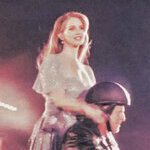
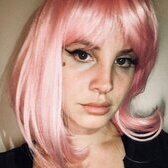
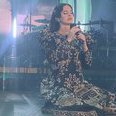

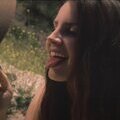
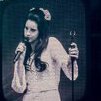

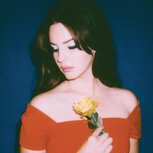
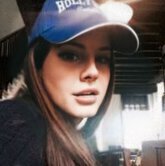

.thumb.jpg.e8ad699ac28fa0ab39b28105c699a6f0.jpg)
